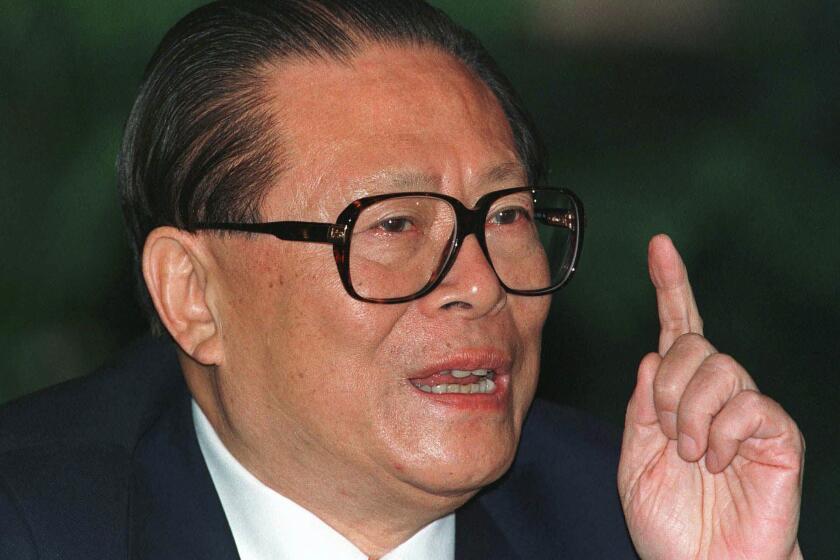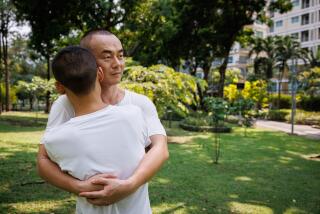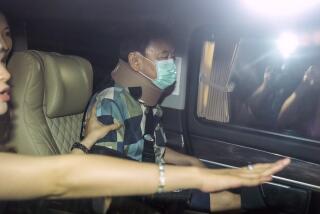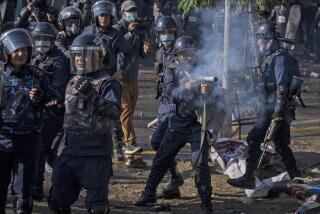In defiance of law, protesters in Thailand demand curbs on king’s powers
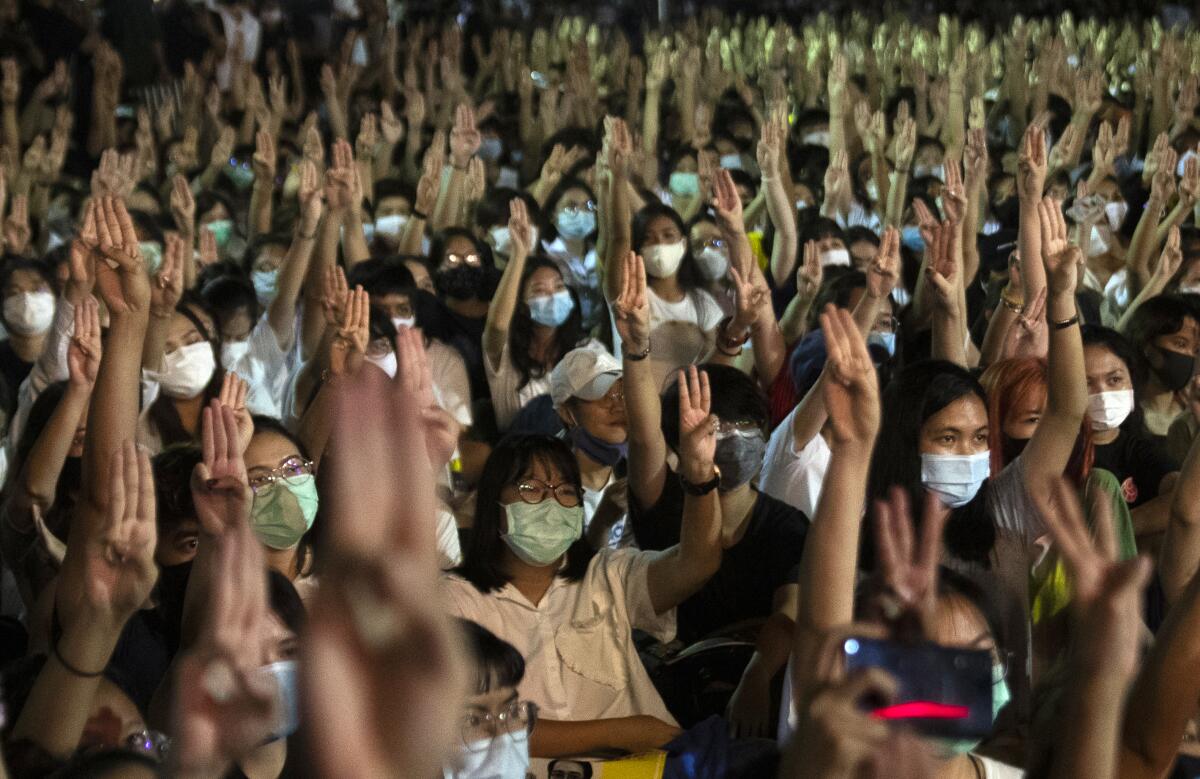
- Share via
SINGAPORE — For years, critics of Thailand’s powerful king have chosen their words carefully, opting for allegories about his late poodle Foo Foo, inside jokes about his multiple marriages or references to Germany, where he lives almost full time at a hotel in the Bavarian Alps.
Lately, some have donned Harry Potter costumes to evoke Lord Voldemort, the evil wizard so feared that his name must not be spoken.
The comparison isn’t without basis: The Thai monarchy is cocooned from criticism by one of the world’s strictest lèse-majesté laws, which punishes insults to the sovereign or his heirs by up to 15 years in prison. Though irregularly enforced, the law has muzzled discussion of an absentee king who has amassed more wealth and political power than any since Thailand’s constitutional monarchy was established in 1932.
Yet in an extraordinary show of defiance, student leaders and protesters across Thailand are now calling publicly for King Maha Vajiralongkorn’s powers to be curtailed in weeks of snowballing demonstrations that have astonished observers by directly challenging the royal establishment.
“Today we will speak openly about the monarchy,” student leader Panusaya Sithijirawattanakul told a crowd of thousands Monday at Thammasat University outside Bangkok.
“In the past, there have been statements fooling us by saying that people born into the royal family are incarnations of gods or angels. With all due respect, please ask yourselves, are you sure that angels or gods have this kind of personality?”

Protest leaders read out 10 demands, including revoking the lèse-majesté law, cutting the monarchy’s budget, banning the ruler from playing any role in politics, pruning the extensive royal security force and investigating the disappearances of critics of the king.
A statement called it “not a proposal to topple the monarchy” but a way for the king “to continue to be esteemed by the people within a democracy.”
The demonstrators appear headed for a collision with conservative, pro-royal forces led by the prime minister, former Gen. Prayuth Chan-ocha, and a military that has squashed past street movements with brutality. In an apparent bid to defuse tensions, organizers called off a protest scheduled for Wednesday, the Queen Mother’s birthday, when the king is due to visit Bangkok.
“I cannot think of any parallel in modern Thai history to what’s happening right now,” said Matthew Wheeler, Bangkok-based senior analyst for the International Crisis Group.
Early in December, Surachai Danwattananusorn went uncharacteristically silent.
“We’re definitely in a new environment in which the monarchy’s political role is being discussed critically in public,” Wheeler said. “In some ways, we could say it was bound to happen at some point. What we haven’t really seen yet is what is the reaction going to be from the royalists.”
Although officials have signaled that they would offer the demonstrations some space, authorities last week arrested two protest leaders, civil rights lawyer Arnon Nampha and student activist Panupong Jadnok, charging them with sedition and other crimes. Both were released on bail and spoke at Monday’s rally.
“From now on, questioning the monarchy with respect must be done publicly,” Arnon told the crowd. “And from now on, no one should be harassed for speaking out about the monarchy.”
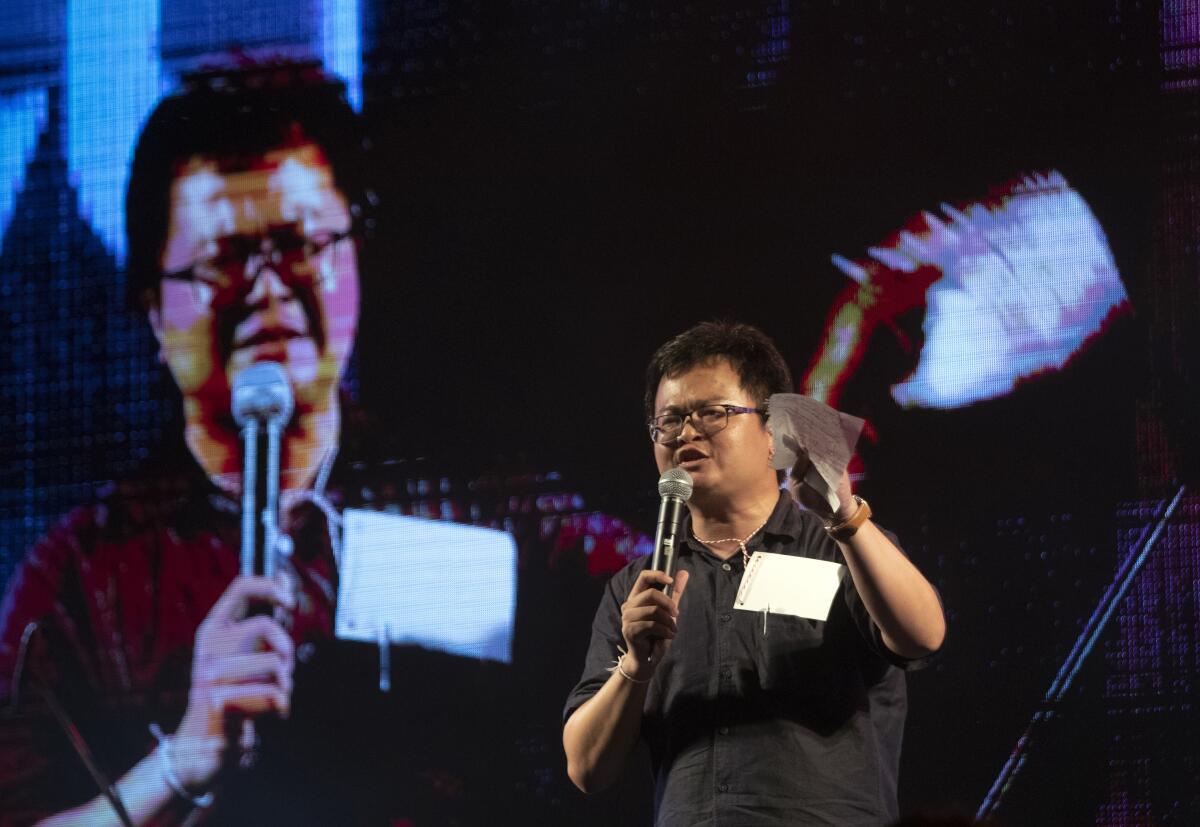
Prayuth told reporters Tuesday that he was uncomfortable with the protest and wondered if “it has gone too far.” Earlier, a Cabinet minister warned students “not to infringe [on] others’ rights or offend the country’s highest institution. Nobody will accept it.”
A confrontation could plunge Thailand into another prolonged period of unrest less than a year and a half after Thailand’s first election since a 2014 military coup.
Public anger has been mounting since the coup, which was followed by an extended period of army rule, widespread arrests and harassment of protesters, the abrupt passage of a new constitution granting the military an outsize political role, the court-ordered dissolution of popular opposition parties and the flawed March 2019 election that kept the coup leader, Prayuth, in power.
Then came the COVID-19 pandemic, which has hammered an economy that was already grappling with declining production and rising inequality.
Through all this, the 68-year-old Vajiralongkorn has mostly remained in Germany, flying back to Bangkok only for occasional day visits with an entourage including his fourth wife, Queen Suthida.
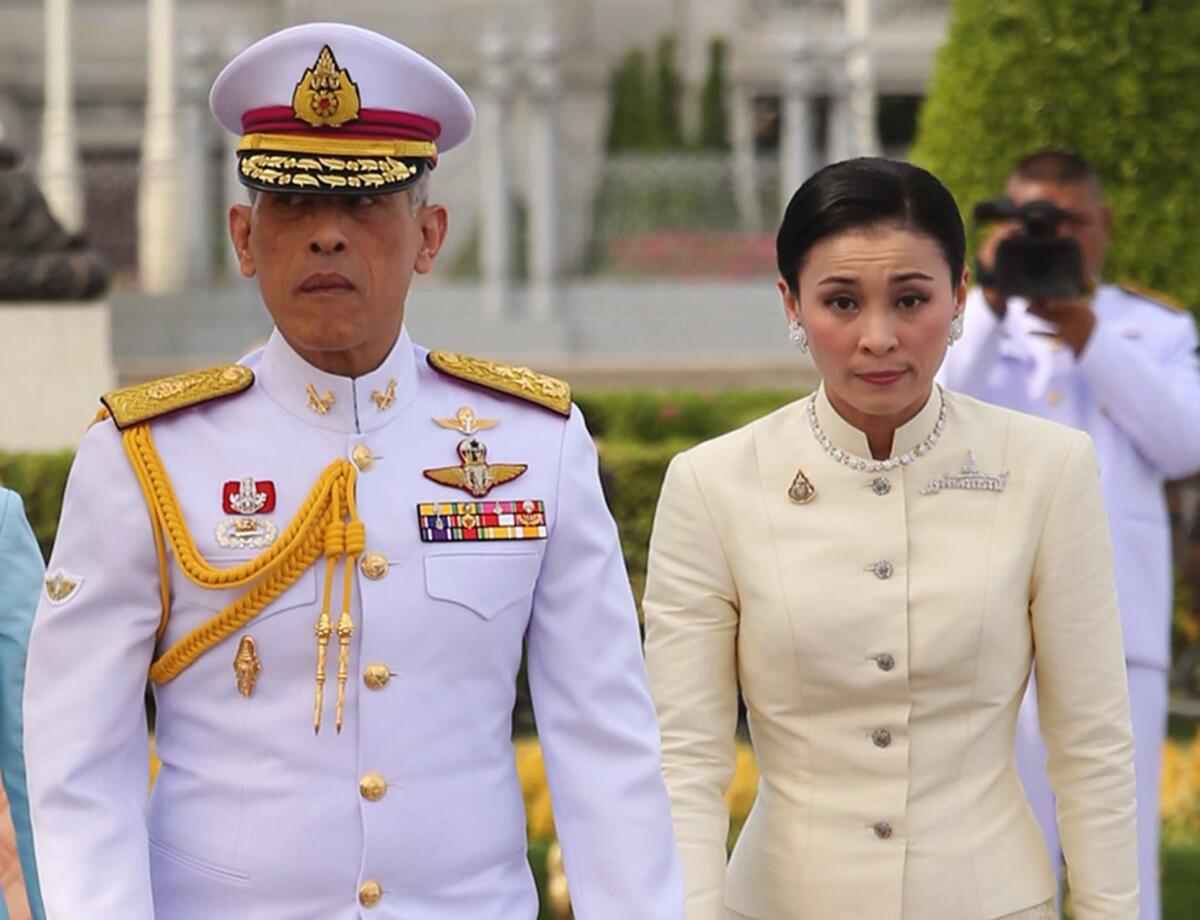
Adding to resentment over his absence and taxpayer-funded lifestyle are a series of moves he has made to expand power since ascending to the throne in 2016 after the death of his long-reigning and widely beloved father.
Vajiralongkorn ordered changes to the new constitution to make it easier for him to rule from overseas, placed two army regiments under his direct command and took personal ownership of the Crown Property Bureau, a vast real estate and investment portfolio worth an estimated $70 billion, making him the world’s richest monarch.
“What people have seen is a king that is acting much more directly in his own interests in the political sphere than did his predecessor,” Wheeler said. “People’s patience is wearing thin. Something was going to happen in terms of an expression of grievances, and sure enough, it’s gaining momentum at a time when people are beginning to feel real economic pain.”
Installed on a golden throne under a nine-tiered, white-and-gold umbrella resembling a wedding cake, Thailand’s King Maha Vajiralongkorn was crowned Saturday as ruler of one of the world’s most enduring monarchies in solemn, elaborate ceremonies that sought to unite a fractured nation under gilded pageantry and centuries-old ritual.
The protests, which began this summer as COVID-19 distancing restrictions were eased, initially demanded reforms to the government — including new elections, a new constitution and an end to persecution of critics — but in the last week have directly taken on the monarchy.
At Thammasat University, where organizers conducted temperature checks and handed out sanitizer gel at the entrance, middle-aged Thais mingled with teenagers attending their first political protest. Signs in English and Thai read, “No more fake democracy” and “Stop pretending that this is still a constitutional monarchy.”
“We should not sacrifice our life for just speaking the truth, and we shouldn’t tolerate it anymore,” said a 20-year-old arts student, who gave her name only as Pangpon.
“We don’t want the monarchy,” she added. “I know that’s impossible — I know we have to coexist. I mean, it can stay, but it has to be like the British monarchy and have ceremonies that bring in some income for the country. That’s not what we do. Our monarchy has been sending money to other countries.”
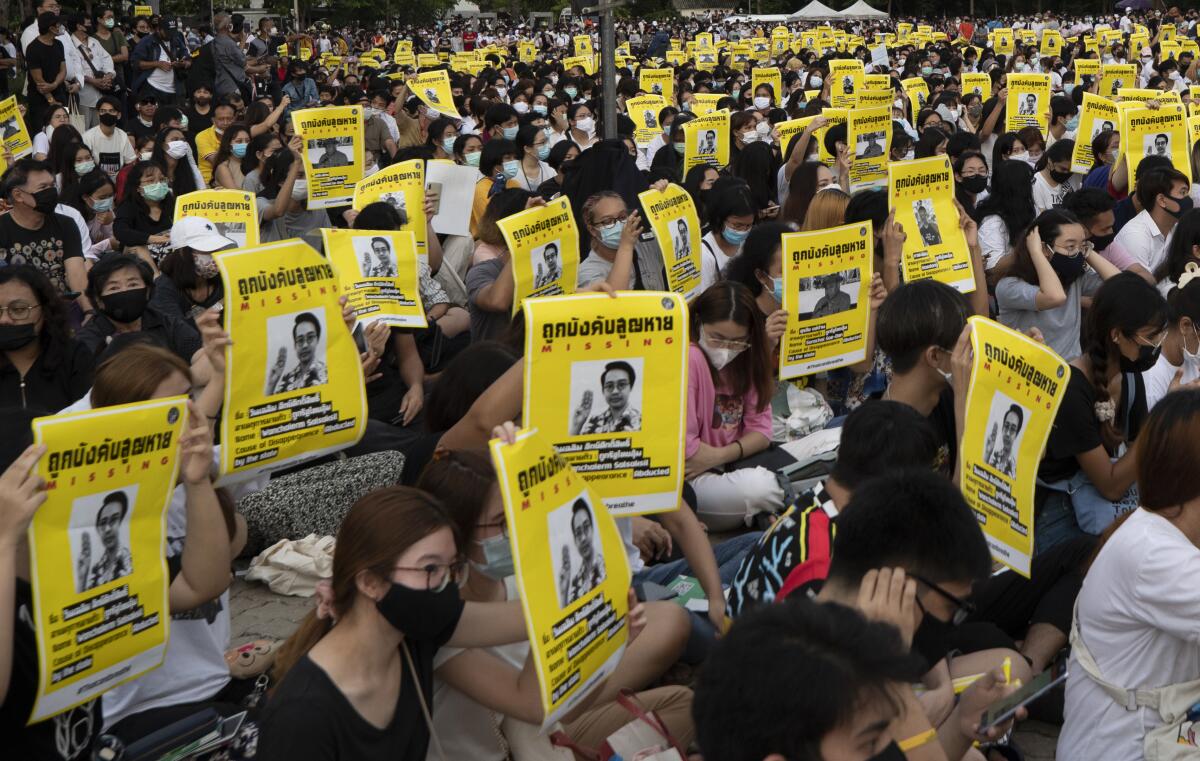
Some demonstrators held portraits of Wanchalearm Satsaksit, a prominent democracy activist who was abducted in June on the streets of the Cambodian capital, Phnom Penh, where he lived in self-exile — the latest in a string of unsolved disappearances of Thai dissidents abroad.
“Wanchalearm has become a legitimate symbol for the protesters, so I am glad that at least his disappearance would not be in vain,” said Pavin Chachavalpongpun, a Thai academic and critic of the monarchy who lives in self-exile in Japan.
More stories from Asia
Social media have amplified the dissent, with internet sleuths tracking the king’s flights and his bike rides through the German countryside. When he dropped into Bangkok for a ceremony in April, without observing COVID-19 quarantine guidelines, the hashtag #WhyDoWeNeedAKing was tweeted more than 1 million times in Thailand.
The Royalists Marketplace, a private Facebook group that discusses and lampoons the monarchy — the featured photo shows the king descending a water slide in a swimsuit — has added nearly 900,000 members since Pavin launched it in April. Thai authorities have demanded that Facebook shut it down, Pavin said, but the page remains active.
“As owner of this group, I have seen the protests spread to almost every province in Thailand,” he said. “I do think this could lead to some concrete changes in Thai politics. I would never have believed it myself to see student protests having come this far already. I’ve campaigned for a decade for the right to criticize the monarchy, and still this has me shocked.”
A special correspondent in Bangkok contributed to this report.
More to Read
Sign up for Essential California
The most important California stories and recommendations in your inbox every morning.
You may occasionally receive promotional content from the Los Angeles Times.
